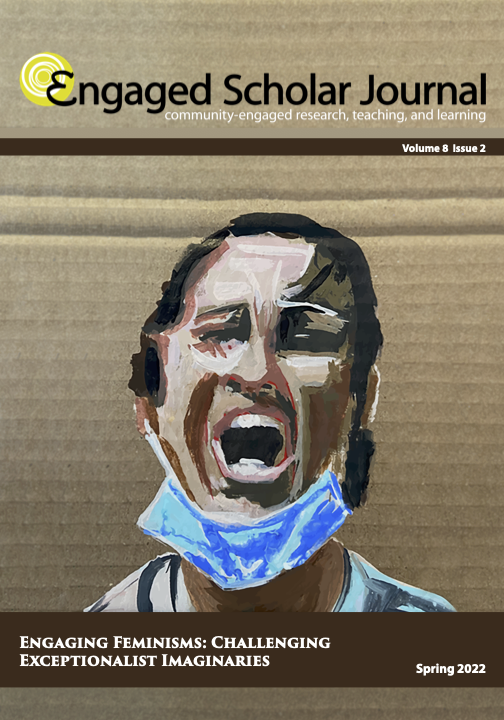Principles Based Budgeting: Resources for Revisioning Academic Planning
DOI:
https://doi.org/10.15402/esj.v8i2.70786Keywords:
deep-rooted principles, budgeting, resource allocation, performance measurementAbstract
In working toward a budgeting framework that responds to the often harmful impacts of neoliberal accounting practices on people and places, this research has been guided by deep-rooted principles that were gifted to the University of Saskatchewan, through a rigorous Indigenous-led community consultation process which interpreted institutional strategic principles, using Cree and Michif terms: nākatēyihtamowin | nakaatayihtaamoowin (sustainability), nihtāwihcikēwin | nihtaooshchikaywin (creativity), nanātohk pimātisowina | nanaatoohk pimatishoowin (diversity), and āniskōmohcikēwin | Naashkoopitamihk (connectivity). This consultation demonstrated the pressing need to redefine what a successful budgeting framework might mean by looking beyond the role of a financial plan and adopting a more broad-based approach using socially and environmentally responsible lenses that incorporate new directions based on Indigenous knowledges, world views, and values invested in creating a more inclusive and productive campus in targeted, incremental, and structural ways. This exploratory study builds on information gathered internally from the university’s student governance structures, broad conversations within an ad hoc advisory group, and relevant literature. An important role of budgeting is that it can guide performance measurement and management; our exploration included looking for ways to identify potentially “new-old” measurements of success as they pertain to the university’s stated objectives and aspirational goals. Current challenges of resource allocation faced by the university were reviewed to identify bottlenecks based on funding limitations that cause barriers to accessibility to academic and non-academic supports, and undesirable environmental effects. Our study raises more questions than answers, but provides insight into potential future processes, which we anticipate in this field report.
References
Brewer, P., Garrison, R., Noreen, E., Kalagnanam, S., & Vaidyanathan, G. (2020). Introduction to managerial accounting, 6th Canadian Edition. McGraw-Hill Ryerson Ltd.
Canadian Centre for Policy Alternatives (CCPA) (2018). Getting There AFB2018: Alternative Federal Budget 2018. https://www.deslibris.ca/ID/10095584.
Cooper, D. J., & Ezzamel, M. (2016). A critical analysis of the Balanced Scorecard: Towards a more dialogic approach. In J. Haslam and P. Sikka (Eds.) Pioneers of critical accounting. pp. 201-230. Palgrave Macmillan, London.
Dei, G. (2016). Decolonizing the university: The challenges and possibilities of inclusive education. Socialist Studies/Études Socialist Studies, 11(1), 23–23. Retrieved from https://socialiststudies.com/index.php/sss/article/view/24704
Department of Finance Canada (DFC). (2021). Toward a quality of life strategy for Canada. https://www.canada.ca/en/department-finance/ servicees/publications/measuring-whatmatterstoward-
quality-life-strategy-canada.html.
Fairbairn, B. (2017). No-brainer or brain twister? Linking planning and budgeting. Planning for Higher Education Journal, 45(3), 31-40. Retrieved from https://www.scup.org/journal/pdfs/PHEV45N3_FeatureArticle_Linking_Planning_And_Budgetin g_Fairbairn.pdf.
Frenz, P., & Vega, J. (2010). Universal health coverage with equity: What we know, don’t know and need to know. Retrieved from https://healthsystemsresearch.org/hsr2010/images/stories/9coverage_with_equity.pdf.
Government of New Zealand (NZG). (2021). Wellbeing budget 2021: Securing our recovery. Retrieved March 3, 2022, from https://www.treasury.govt.nz/publications/wellbeing-budget/wellbeingbudget-2021-securing-our-recovery-html.
Kaplan, R., & Norton, D. (1996). The balanced scorecard: Translating strategy into action. Harvard Business School Press.
Kavanagh, S., & Kowalski, J. (2021). The basics of equity in budgeting. Government Finance Review, February, pp. 18-27.
Kenno, S., Lau, M., Sainty, B., & Boles, B. (2021). Budgeting, strategic planning and institutional diversity in higher education. Studies in Higher Education, 49(9), 1919-1933.
Khosla, P. (2021). Gender equality and intersectional analysis toolkit. Canadian Research Institute for the Advancement of Women.
Libby, T., & Lindsay, R. M. (2003a). Budgeting – An unnecessary evil: How the BBRT envisions a world without traditional budgeting. CMA Management, 77(1), 30-33.
Libby, T., & Lindsay, R. M. (2003b). Budgeting – An unnecessary evil: How the BBRT envisions a world without traditional budgeting. CMA Management, 77(2), 28-31.
Libby, T., & Lindsay, R. M. (2010). Beyond budgeting or budgeting reconsidered? A survey of North American budgeting practice. Management Accounting Research, 21(1), 56-75.
Marra, K., & Espinosa, I. (2020). Bottlenecks and barriers to effective coverage of early childhood health and development interventions in Guatemala: A scoping review. Revista Panamericana de Salud Pública, 44, 1. https://doi.org/10.26633/RPSP.2020.105.
Merchant, K.A., & Van der Stede, W. A. (2007). Management control systems: Performance Measurement, evaluation and incentives, 2nd Edition. Prentice Hall.
Pape, M., & Lerner, J. (2016). Budgeting for equity: How can participatory budgeting advance equity in the United States? Journal of Public Deliberation, 12(2): Article 9. https://doi.org/10.16997/jdd.261
Reimer, D., & Pollak, R. (2010). Educational expansion and its consequences for vertical and
horizontal inequalities in access to higher education in West Germany. European Sociological Review, 26(4): 415-430. https://doi.org/10.1093/esr/jcp029
Sasakamoose K. B., Rosenberg, R., Fitzsimmons, S., Drozd, H., Brophy, C., & Walling, E. Equity indicators framework. (2020). Equity indicators framework. Anti-Racism Network.
Sharp, R. (2003). Budgeting for equity: Gender budget initiatives within a framework of performance oriented budgeting. United Nations Development Fund for Women (UNIFEM).
Stewart, F., Brown, G., & Cobham, A. (2009). The implications of horizontal and vertical inequalities for tax and expenditure policies. University of Oxford: Centre for Research on Inequality, Human Security and Ethnicity.
The SROI Network (2012). A guide to social return on investment. The SROI Network.
Published
How to Cite
Issue
Section
License
Authors who publish with this journal agree to the following terms:
- Authors retain copyright and grant the journal right of first publication with the work simultaneously licensed under a Creative Commons Attribution License CC BY 4.0 that allows others to share the work with an acknowledgement of the work's authorship and initial publication in this journal.
- Authors are able to enter separate, additional contractual agreements for the non-exclusive distribution of the journal's published version of the work (e.g., post it to an institutional repository or publish it in a book), with an acknowledgement of its initial publication in this journal.
- Authors are permitted to post their work online (e.g., in an institutional repository or on their website) after the publication of their work in the Engaged Scholar Journal.
- Please note that while every opportunity will be taken to ensure author participation in the editing process, due to time constraints final copyediting changes may be made before publication to ensure APA adherence throughout all submissions.




